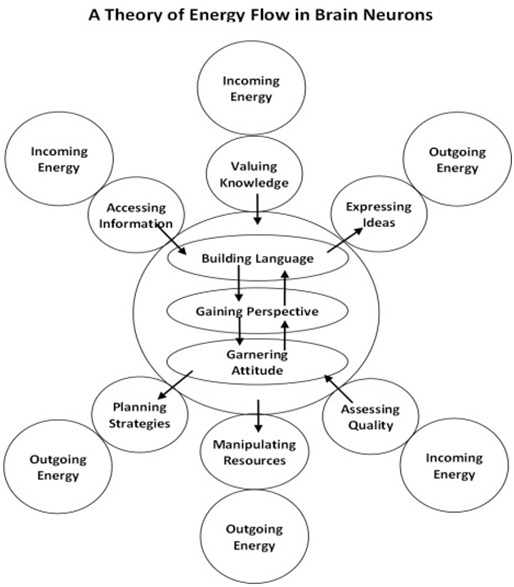Published on
Knowledge Management as Educational Science

Can we create a science of knowledge management that teachers can use to influence learning? In the previous seven articles, I have outlined a system of knowledge management that can be used to design, manage and implement a comprehensive model of education. Do knowledge management systems have a basis in science? I believe they do.
Lowest Common Denominator of Knowledge
The human brain is made up of networks of hundreds of billions of interneurons. Those networks process the knowledge energy of our minds. The human brain is both simple and complex. The lowest common denominator of knowledge happens as the function of a single brain neuron or interneuron. All interneurons function similarly. They take in energy, process it, store it and release it. In the diagram I have equated this energy action to the nine element learning process. What I am saying is that each brain neuron is similar to a mini computer. Imagine hundreds of billions of computers connected and interconnected and automatically influencing each other and you have the complexity of human knowledge.
Our brains are made up of millions of interneuron chain combinations that reflect the actions and interactions of our bodies with the environment. In other words, it “digitally” records our lives. But the brain is not only reactive, it is also proactive. Interneurons have evolved beyond processing energy to actually initiating new energy, which we know as abstract thought.
In simple terms, we are what we think we are, and we are all different. While human beings have 99.9% common DNA, the only thing our minds have in common is the function of brain neurons. Our knowledge is determined by the way all those neurons are organized and no two minds are the same. Our minds even see common experiences differently. So it would seem that there is no possible way to find commonality in the way we learn.
Managing Knowledge for Systems Thinking
Systems of brain neurons function as complex versions of single brain neurons. While, the neuron chains we build are diverse, the process we use to build them is a common one. So managing neuron chains is a repetitious and self-managing process of building (and re-building), using, organizing, integrating (personalizing), and proliferating different versions of the neuron chains for various purposes.
Our brains function systematically. We can be in tune with this or we can ignore it. To be in tune with this systematic function of the brain is to be in tune with nature. Those who achieve success in life (regardless of how they define success) know this. From the search for enlightenment to the amassing of a fortune, from becoming a professional to building new theory of something, from being a good manager to becoming a successful entrepreneur, all require an inherent understanding of systems. The question is, of course, how do we become systematic thinkers? As it stands, this is an undefined discovery process. If we knew this process, we use it to influence achievement of success more easily. We use education as the environment to make this happen?
Educating to Think Systematically
Can we create education systems that enable us to be inherently successful? I believe that we can and I believe that we can build a scientific foundation for it as well. Managing knowledge as a system and using that system to educate will result in the development of systems thinking and proactive learners.
The articles in this series outline a model for educating for success. It is a matter of managing knowledge. It is a matter of developing systems thinking. It is a matter of being practical about the science of the brain. We know enough now to make it happen.
Author Perspective: Business



